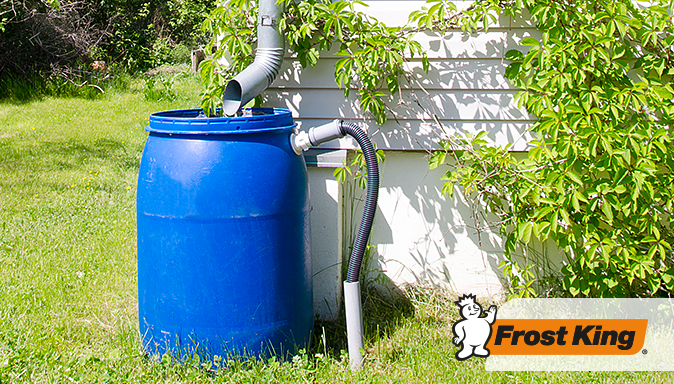Looking for an easy way to go green? A rain barrel captures rainwater from your gutters and stores it for use in your yard and garden, conserving water (and saving you money on your water bills too).
Did you know that during an average summer rain shower (we’re talking storms that cause 1 inch of rainfall) more than 600 gallons of water drain from your roof into gutters and through downspouts? Don’t let all that water go to waste! A rain barrel collects rainwater by diverting it from your downspouts into a storage container. It’s a simple solution that can pay off with a big environmental impact.
3 Benefits of Rain Barrels
1. Rain Barrels Save Money: Keeping your yard, lawn, gardens, and potted plants lush and green all summer takes a lot of water. According to the US Environmental Protection Agency, a rain barrel can save as much as 1,300 gallons of water during the peak summer months—and that can save you as much as $35 a month on your water bill, according to a national survey by DC Urban Gardeners. And every time it rains, your water supply gets replenished naturally so it’s a free source of water for your landscaping needs.
2. Rain Barrel Water is Better for Your Plants: Tap water can be loaded with salts, chlorine, iron, minerals, and other chemicals that can build up in your soil and harm your plants. Rainwater—which is free of chemicals and has fewer contaminants—is a better choice for your pots and landscaping. (But use it safely: rainwater isn’t potable so don’t use it for things like drinking, bathing, or washing your car.)
3. Rain Barrels Reduce Stormwater Runoff: That 600 gallons of water draining from your roof during summer showers that we mentioned earlier? The ground can’t absorb all that water at once, so it flows through your yard, driveway, streets, and parking lots picking up dirt, leaves, debris, litter and anything else that gets in its path until it hits the nearest stream, lake, river or other body of water. This runoff can cause devastating flooding, erosion, and pollution, so diverting some of this stormwater into a rain barrel goes a long way towards minimizing damage and maintaining your community’s water quality.
How to Use a Rain Barrel
Rain barrels come in a variety of sizes and can be found at most hardware or gardening stores. You can even find kits to DIY your own rain barrel out of a clean, empty barrel. Whatever route you decide to go, pick a flat, level space to install your rain barrel. You’ll want to raise the barrel off the ground to increase gravity flow, but keep in mind that when it’s full your barrel will weigh over 400 pounds so make sure your base is sturdy and solid.
The setup is relatively simple: water is diverted from your downspout into the barrel, which holds the water until you’re ready to use it. Most rain barrels have a spigot located near the bottom of the barrel that you can use to fill watering cans or attach hoses.
Starting with clean gutters can help you collect as much water as possible and will minimize the amount of leaf litter that makes its way into your storage container. After you’ve installed your rain barrel, clean gutters, then prevent future leaves and debris from clogging your newly clean gutters and downspouts by installing Frost King’s Vinyl Snap-in Gutter Screens and Plastic Downspout Guards.
Once the barrel is set up, it’s relatively maintenance free:
• Be sure the spigot is closed before a rainstorm to capture the rainwater. If you know a storm is coming, make sure the barrel is empty so the barrel doesn’t overfill and empty into your yard.
• Check the rain barrel regularly to make sure all the fittings are secure.
• In late fall, completely drain the barrel and store it upside down in a protected place.
